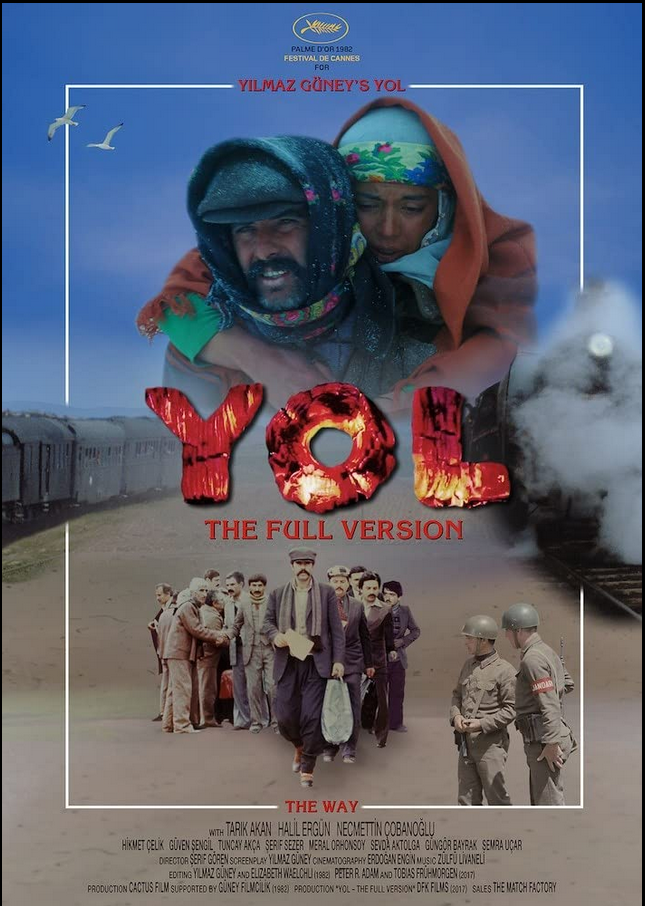
Today I want to talk about a splendid Turkish film that has gone unnoticed, at least for me it has, from the big billboards that the mainstream media, social networks, specialised websites and blogs, critics and opinion in general offer us on a daily basis.
I am talking about Yol, written by Yılmaz Güney in prison and directed under precise indications by Serif Gören.
This summary introduction is a bit anticipating the plot because it tells us about a post-coup Turkey in 1980 (in fact the creator of the story is detained as a political prisoner against the regime), a singular story that tells us about its people and its authorities through the stories of five prisoners who are given a week's leave to visit their relatives and friends.

The story begins with five detainees in different Turkish classes. Each of them is given a week's leave to visit their respective families.
When they arrive at their destination, each will realise how social, cultural and political conflicts have affected their relationships during this time.
One of them, Seyit Ali (played by Tarik Akan) when he arrives home discovers that his wife has betrayed him and is now working as a prostitute. Maintaining a strict code of honour, the wife's relatives have kidnapped her and to free her they demand the death of her husband through a so-called "honour killing", i.e. his death at the hands of one of the family members to avenge the dishonour caused - through his apparent guilt - as they claim the situation has reached that limit because Seyit is detained and has not been able to support his wife.
The only solution is to flee through the snow (they live in a high mountain village totally isolated from the rest), but on that journey his wife freezes to death and the drama ends, and from that moment on he considers himself a man free of family pressure.
Another prisoner, Mehmet Salih (played by Halil Ergün) discounts his sentence for a robbery together with his brother-in-law whom he abandoned to his fate during the shooting, and this image and his memories torture him in the aftermath. When he arrives at his destination, he finds that his in-laws have disinherited him. By mutual agreement he decides to escape with his wife Ermine (Meral Orhonsay) but they are caught on the train by the police. A relative of the wife's smuggles himself onto the train and kills them both.
Ömer (Necmettin Çobanoğlu) returns to his village on the border between Turkey and Syria with the firm conviction to escape and not return to prison. In a shootout between smugglers (of which he is a member) and the police, his brother is killed. According to tradition, the surviving brother must take care of the rest of the family, which is why Ömer gives himself up to the police instead of meeting certain death.
Of the remaining two, one does not even get to visit his relatives, as he loses the papers confirming his permission to travel and, due to the inflexibility of the police control, he has to return to prison.
Melvüt (Hikmet Çelik), the last of them, finds his girlfriend and his parents, but realises that in reality he will have no freedom at all. From carceral control he passes to family control, where all his girlfriend's relatives despise him and control his every act. The oppression of certain customs and habits will prevent him from becoming a free man.
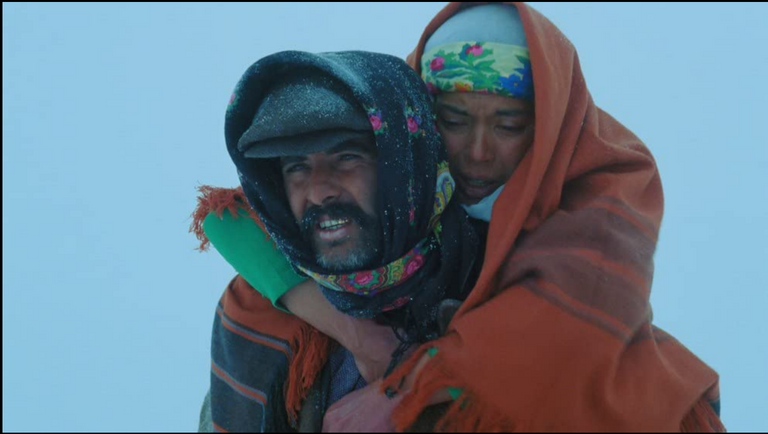

Although the stories sound dissimilar, they share a common theme: the disenchantment, the disillusionment of finding freedom again, even if only for a few days.
Some die. Others will return to prison. To realise that inside or outside, the future for them will not change much.
Yol is a passionate and realistic film about the social, economic and especially political reality of a Turkey under military rule.
With a society as repressive as the regime itself towards those who have broken the law and have to serve a reduced sentence. It is a reflective film about criminal and social condemnation.
Becoming free men is more a utopia than a reality. It does not depend only on serving the sentence. It depends especially on submitting to the strict controls and prejudices that society imposes on them.
Deservedly winner of the Palme d'Or for best foreign film at the Cannes Film Festival in 1982 and the Golden Gold Awards at the same year.
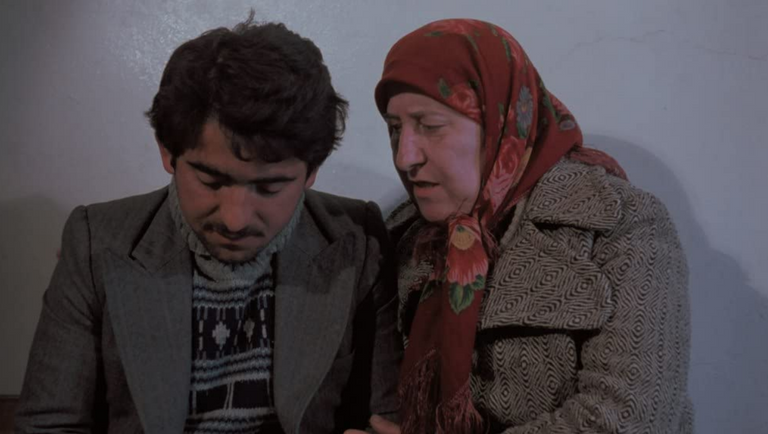

Tarik Akan as Seyit Ali
Serif Seze as Ziné
Halil Ergün as Mehmet Salih
Meral Orhonsay as Emine
Necmettin Çobanoglu as Omer
Semra Uçar as Gulbahar
Hikmet Çelik as Mevlat
Sevda Aktolga as Meral

Hoy les quiero hablar de una espléndida película turca que ha pasado no se si desapercibida, al menos para mí si, de las grandes carteleras que nos ofrecen a diario los grandes medios de comunicación, las redes sociales, los sitios webs y blogs especializados, la crítica y la opinión en general.
Estoy hablando de Yol (que traducido an español sería El Camino) escrita por Yılmaz Güney en la cárcel y dirigida bajo indicaciones precisas por Serif Gören.
Esta sumaria introducción un poco está anticipando la trama porque nos habla de una Turquía posterior al golpe de estado de 1980 (de hecho el creador de la historia está detenido como prisionero político contrario al régimen), una historia singular que nos habla de su gente y sus autoridades a través de las historias de cinco prisioneros que tienen una semana de permiso para visitar a sus parientes y amigos.

La historia parte con cinco detenidos en distintas clases turcas. Cada uno de ellos con una semana de permiso para visitar a sus respectivas familias.
Cuando llegan a destino cada uno se dará cuenta como los conflictos sociales, culturales y políticos han afectados sus relaciones durante todo este tiempo.
Uno de ellos, Seyit Ali (interpretado por Tarik Akan) cuando llega a su casa descubre que su esposa lo ha traicionado y ahora trabaja como prostituta. Manteniendo un estricto código de honor los familiares de la esposa la han secuestrado y para liberarla exigen la muerte de su marido a través del llamado "asesinato de honor", es decir su muerte a manos de uno de los integrantes de la familia para vengarse del deshonor causado -por su aparente culpa- ya que sostienen la situación ha llegado a ese límite por estar Seyit detenido y no haber podido mantener a su esposa.
La única solución es huir a través de la nieve (viven en un pueblo de alta montaía totalmente aislado del resto), pero en ese recorrido su esposa muere congelada y el drama termina, considerándose a partir de ese momento un hombre libre de la presión familiar.
Otro de los prisioneros prisioneros, Mehmet Salih (interpretado por Halil Ergün) descuenta su condena por un robo junto con su cuñado a quien abandonó a su suerte durante el tiroteo y esta imagen con sus recuerdos lo torturan en continuación. Cuando llega a destino se encuentra con que sus suegros lo han desheredado. De comén acuerdo decide escapar con su esposa Ermine (Meral Orhonsay) pero son atrapados en el tren por la policía. Un familar de la esposa se introduce clandestinamente en el tren y mata a ambos.
Ömer (Necmettin Çobanoğlu) regresa a su aldea en el confín entre Turquia y Siria con la firme convicción de escapar y no regresar a la cárcel. En un tiroteo entre contrabandistas (de los que hace parte) y la policía su hermano muere. De acuerdo a la tradición el hermano sobreviviente debe hacerse cargo del resto de la familia, por este motivo Ömer se entrega a la policía, en vez de ir al encuentro d euna muerte segura.
De los dos restantes uno ni siquiera llega a visitar sus familiares ya que pierde los papeles que confirman su permiso para viajar y ante la inflexibilidad del control policial debe volver a la cárcel.
Melvüt (Hikmet Çelik)el último de ellos encuentra su novia y sus padres, pero se da cuenta que en realidad no gozará de ninguna libertad. Del control carcerario pasará al control familiar donde todos los familiares de su novia lo desprecian y controlan cada mímino acto que realice. La opresión de ciertos usos y costumbres le impedirá de transformarse en un hombre libre.
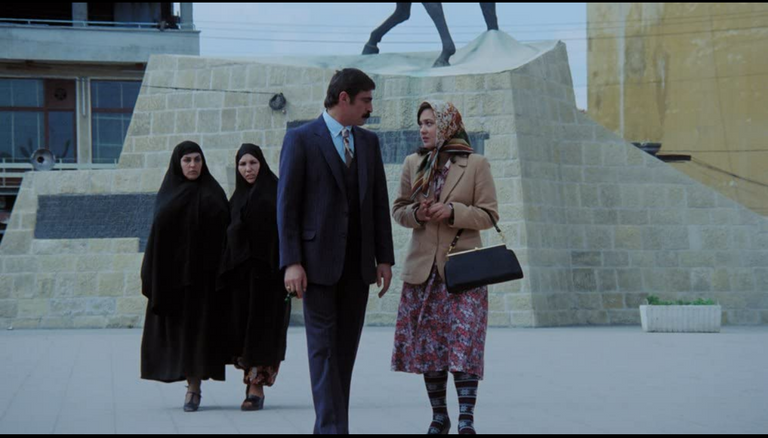

Si bien las historias sono disímiles entre sí, tienen en un argumento en común: el desencanto, la desilusión al reecontrar la libertad, aunque sea por pocos días.
Algunos mueren. Otros volverán a la prisión. Para darse cuenta que dentro o fuera de la misma el futuro para ellos no cambiará demasiado.
Yol es una apasionada y realista película sobrec la realidad social, económica y especialmente política de una Turquía sometida al régimen militar.
Con una sociedad tan represiva como el mismo régimen respecto a quienes han infranto la ley y deben descontar la pena. Es un film reflexivo sobre la condena penal y la condena social.
Transformarse en hombres libres es más una utopía que una realidad. No depende solo de cumplir la pena. Depende especialmente de someterse a los estrictos controles y prejuicios que la sociedad les impone.
Merecidamente ganadora de la Palma de Oro al mejor film extranjero en el Festival de Cannes en el año 1982 y de los Premios Globos de Oro (Golden Gold Awards) en el mismo año.
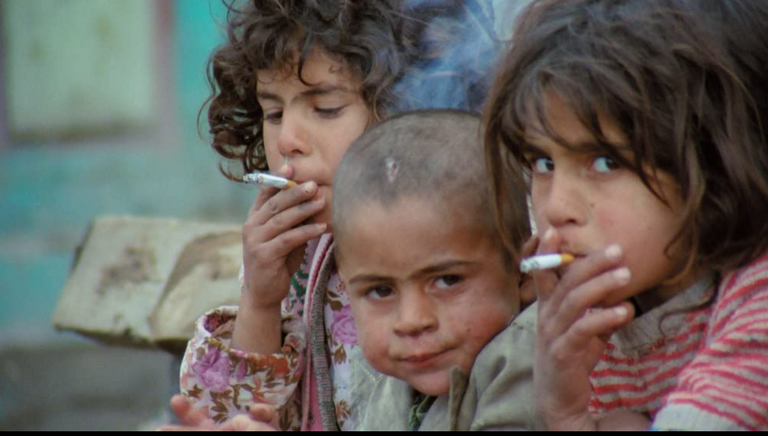

Tarik Akan como Seyit Ali
Serif Seze como Ziné
Halil Ergün como Mehmet Salih
Meral Orhonsay como Emine
Necmettin Çobanoglu como Omer
Semra Uçar: Gulbahar
Hikmet Çelik: Mevlat
Sevda Aktolga: Meral


Sources consulted (my property) for the preparation of this article. Some paragraphs may be reproduced textually.
Fuentes consultadas (de mi propiedad) para la elaboración del presente artículo. Algunos párrafos pueden estar reproducidos textualmente.
| Argentina Discovery. |  |
|---|---|
| Galería Fotográfica de Argentina. |  |
| Viaggio in Argentina. |  |
| Patagonia Express. |  |
